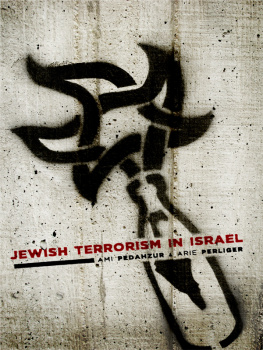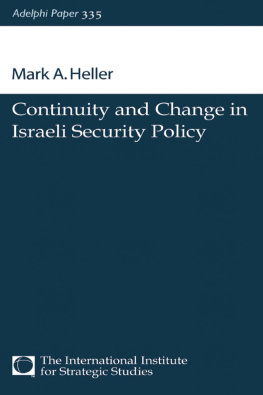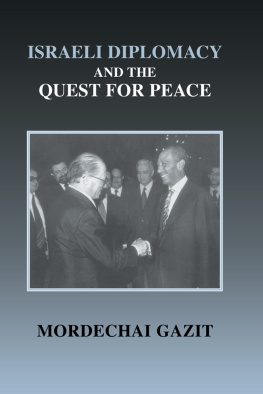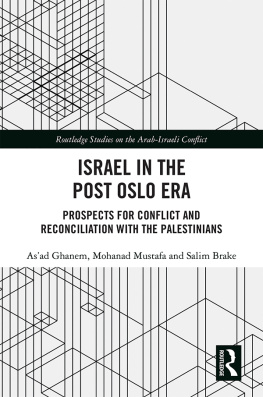The Triumph of Israels Radical Right
The Triumph of Israels Radical Right
AMI PEDAHZUR


Oxford University Press is a department of the University of Oxford.
It furthers the Universitys objective of excellence in research,
scholarship, and education by publishing worldwide.
Oxford New York
Auckland Cape Town Dar es Salaam Hong Kong Karachi
Kuala Lumpur Madrid Melbourne Mexico City Nairobi
New Delhi Shanghai Taipei Toronto
With offices in
Argentina Austria Brazil Chile Czech Republic France Greece
Guatemala Hungary Italy Japan Poland Portugal Singapore
South Korea Switzerland Thailand Turkey Ukraine Vietnam
Oxford is a registered trade mark of Oxford University Press
in the UK and certain other countries.
Published in the United States of America by
Oxford University Press
198 Madison Avenue, New York, NY 10016
Oxford University Press 2012
All rights reserved. No part of this publication may be reproduced,
stored in a retrieval system, or transmitted, in any form or by any means, without
the prior permission in writing of Oxford University Press, or as expressly
permitted by law, by license, or under terms agreed with the appropriate
reproduction rights organization. Inquiries concerning reproduction outside the
scope of the above should be sent to the Rights Department, Oxford University Press,
at the address above.
You must not circulate this work in any other form
and you must impose this same condition on any acquirer.
Library of Congress Cataloging-in-Publication Data
Pedahzur, Ami.
The triumph of Israels radical right / Ami Pedahzur.
p. cm.
Includes bibliographical references and index.
ISBN 978-0-19-974470-1 (hardback : alk. paper)
1. IsraelPolitics and government1993 2. Right and left (Political science)
3. Arab-Israeli conflict1993Influence. 4. Jewish radicalsIsrael.
5. Palestinian ArabsPolitics and government21st century. I. Title.
JQ1830.A58P45 2012
324.2569403dc23 2012006847
1 3 5 7 9 8 6 4 2
Printed in the United States of America
on acid-free paper
CONTENTS
ILLUSTRATIONS
Maps
Appendix Figures
ACKNOWLEDGMENTS
This book brings a long journey, almost two decades long, to conclusion. Over the years I received the support of many dear friends and colleagues. I only wish that I had an opportunity to thank each and every one of them in person.
I would like to thank three individuals who inspired this project and supported it since its very inception in the mid 1990s. First, the late Ehud Sprinzak, whose seminal book The Ascendance of Israels Radical Right sparked my curiosity and indirectly determined the course of my academic career. Without even knowing me, Ehud was kind enough to offer his support and encouragement when I was taking my first steps as an MA student. Second, my longtime mentor, Yael Yishai, who took me under her wing and with her infinite patience and wisdom paved my academic path and shaped me as a human being. Last but not least, Bruce Hoffman, who adopted me as his younger brother when I was a PhD student and served as my guardian angel ever since. I dedicate this book to these three remarkable individuals.
I am humbled by the friendship and support of Bob Abzug, Zoltan Barany, Gabi Ben-Dor, Cathy Boone, Avraham Brichta, Gary Freeman, Bryan Jones, and Leonard Weinberg.
I am especially indebted to Cas Mudde, a longtime friend and a role model whose invaluable advice and encouragement over the years pushed me to write the best book that I possibly could.
I would like to convey my gratitude to my editor David McBride from Oxford University Press as well as to the four anonymous reviewers whose comments, suggestions, and critique shaped the manuscript from an initial idea into what I hope is a comprehensive book.
My dear friends Arie Perliger and Alex Bialsky helped me tremendously in conducting the fieldwork. The book could not have been completed without them. Special thanks to my colleague Holly McCarthy, who became the CEO of this project. Holly spent many weeks directing our team of research assistants while she meticulously checked and corroborated facts as well as saved me from making embarrassing grammatical errors. I am also grateful to Yaara Aharony from the Hebrew University who provided me with invaluable research assistance in Israel.
Finally, I thank the loves of my life Galit, Rotem, Shahar, Doron, and Nissim. They serve as a constant reminder for the most important things in life.
TIMELINE OF MAJOR EVENTS
1517 | Ottoman rule over Palestine (Eretz Yisrael). |
1897 | First Zionist Congress and the formation of the World Zionist Organization |
1917 | The Balfour DeclarationIssued by British Foreign Minister Arthur James Balfour. The first and most significant pledge by a superpower to form a Homeland for the Jewish People in Palestine. |
1922 | The British Mandate for Palestine. |
1929 | The massacre of the Hebron Jews. One of the most devastating clashes between Arabs and Jews in Palestine. |
1933 | Adolf Hitler appointed as Chancellor of Germany |
1936 | The Great Arab Revolt. The first organized uprising of the Palestinians. Consists of commercial strikes, demonstrations, and violent attacks against British forces and the Jewish population. |
Peel CommissionA royal commission established to inquire as to the causes for the Arab revolt. |
1938 | Woodhead CommissionA committee formed following the failure of the Peel Commission to bring an end to the revolt. One of its tasks was to provide a plan for the partition of Palestine. |
1939 | The White Paper (aka the MacDonald White Paper) restricts the immigration of Jews to Palestine as well as the purchase of lands by Jews. |
1942 | Wannsee Conference and the Final Solution to the Jewish Question |
1944 | Hunting Season (Saison)The struggle between the Haganah and the Etzel (Irgun), during which the Haganah hands Etzel activists over to the British authorities. |
1947 | David Ben-Gurion sends the Status Quo letter to the leaders of Agudat Yisrael. The letter formalizes the pivotal status of Orthodox Judaism in the future State of Israel. |
The United Nations general assembly votes in favor of the Partition Plan for Palestine. |
1948 | Plan DDevised by the Haganah, its objectives include the transformation of the various Jewish fighting forces into an army as well as to gain strategic advantages during the final weeks of the British Mandate in Palestine. The most controversial aspect of the plan is the decision to take over territories that the UN designated for the Arab State and to subsequently expel their Palestinian residents. |
War of Independence1948 ArabIsraeli War. |
The Declaration of Independence and the official formation of the State of Israel. |
Declaration of a state of emergency, which has prevailed ever since. |











